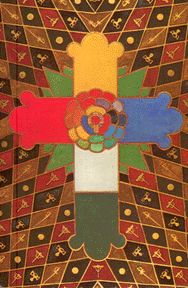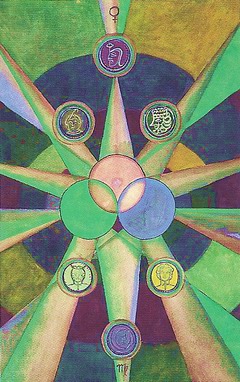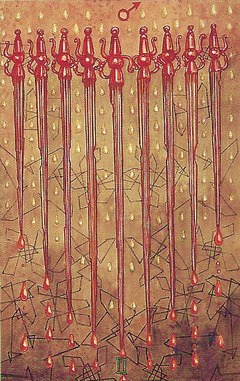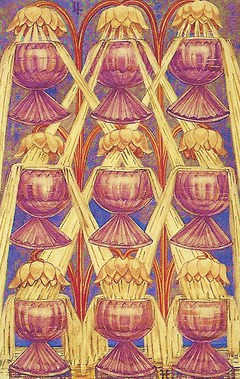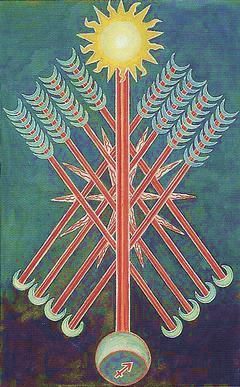Yesod

The Four Nines
These cards are attributed to Yesod. After the double excursion into misfortune, the current returns to the middle pillar. This Sephira is the seat of the great crystallization of Energy. But it takes place very far down the Tree, at the apex of the third descending triangle, and a flat triangle at that. There is little help from low, unbalanced spheres like Netzach and Hod. What saves Yesod is the direct ray from Tiphareth; this Sephira is in the direct line of succession. Each of these cards gives the full impact of the elemental force, but in its most material sense; that is, of the idea of the force, for Yesod is still in Yetzirah, the formative world. Zoroaster says:
"The number Nine is sacred, and attains the summit of perfection." Egypt and Rome, also, had Nine Major Deities.
The Nine of Wands is called Strength. It is ruled by the Moon and Yesod. In "The Vision and the Voice", the eleventh Aethyr gives a classical account of the resolution of this antinomy of Change and Stability. The student should also consult the works of any of the better mathematical physicists. Of all important doctrines concerning equilibrium, this is the easiest to understand, that change is stability; that stability is guaranteed by change; that if anything should stop changing for the fraction of a split second, it would go to pieces. It is the intense energy of the primal elements of Nature, call them electrons, atoms, anything you will, it makes no difference; change guarantees the order of Nature. This is why, in learning to ride a bicycle, one falls in an extremely awkward and ridiculous manner. Balance is made difficult by not going fast enough. So also, one cannot draw a straight line if one's hand shakes. This card is a sort of elementary parable to illustrate the meaning of this aphorism: "Change is Stability."
Here the Moon, the weakest of the planets, is in Sagittarius, the most elusive of the Signs; yet it dares call itself Strength. Defence, to be effective, must be mobile.
The Nine of Cups is called Happiness. This is a peculiarly good card, because happiness, as the word implies, is so much a matter of luck: the card is ruled by Jupiter, and Jupiter is Fortune.
In all these watery cards, there is a certain element of illusion; they begin by Love, and love is the greatest and most deadly of the illusions. The sign of Pisces is the refinement, the fading away of this instinct, which, begun with dreadful hunger and carried on with passion, has now become "a dream within a dream".
The card is ruled by Jupiter. Jupiter in Pisces is indeed good fortune, but only in the sense of complete satiety. The fullest satisfaction is merely the matrix of a further putrefaction; there is no such thing as absolute rest. A cottage in the country with the roses all around it? No, there is nothing permanent in this; there is no rest from the Universe. Change guarantees stability. Stability guarantees change.
The Nine of Swords is called Cruelty. Here the original disruption inherent in Swords is raised to its highest power. The card is ruled by Mars in Gemini; it is agony of mind. The Ruach consumes itself in this card; thought has gone through every possible stage, and the conclusion is despair. This card has been very adequately drawn by Thomson in "The City of Dreadful Night". It is always a cathedral---a cathedral of the damned. There is the acrimonious taint of analysis; activity is inherent in the mind, yet there is always the instinctive consciousness that nothing can lead anywhere.
The Nine of Disks is called Gain. The suit of Disks is much too dull to care; it reckons up its winnings; it does not worry its head about whether anything is won when all is won. This card is ruled by Venus. It purrs with satisfaction at having harvested what it sowed; it rubs its hands and sits at ease. As will be understood from the consideration of the Tens, there is no reaction against satisfaction as there is in the other three suits. One becomes more and more stolid, and feels that "everything is for the best in the best of all possible worlds".
"The number Nine is sacred, and attains the summit of perfection." Egypt and Rome, also, had Nine Major Deities.
The Nine of Wands is called Strength. It is ruled by the Moon and Yesod. In "The Vision and the Voice", the eleventh Aethyr gives a classical account of the resolution of this antinomy of Change and Stability. The student should also consult the works of any of the better mathematical physicists. Of all important doctrines concerning equilibrium, this is the easiest to understand, that change is stability; that stability is guaranteed by change; that if anything should stop changing for the fraction of a split second, it would go to pieces. It is the intense energy of the primal elements of Nature, call them electrons, atoms, anything you will, it makes no difference; change guarantees the order of Nature. This is why, in learning to ride a bicycle, one falls in an extremely awkward and ridiculous manner. Balance is made difficult by not going fast enough. So also, one cannot draw a straight line if one's hand shakes. This card is a sort of elementary parable to illustrate the meaning of this aphorism: "Change is Stability."
Here the Moon, the weakest of the planets, is in Sagittarius, the most elusive of the Signs; yet it dares call itself Strength. Defence, to be effective, must be mobile.
The Nine of Cups is called Happiness. This is a peculiarly good card, because happiness, as the word implies, is so much a matter of luck: the card is ruled by Jupiter, and Jupiter is Fortune.
In all these watery cards, there is a certain element of illusion; they begin by Love, and love is the greatest and most deadly of the illusions. The sign of Pisces is the refinement, the fading away of this instinct, which, begun with dreadful hunger and carried on with passion, has now become "a dream within a dream".
The card is ruled by Jupiter. Jupiter in Pisces is indeed good fortune, but only in the sense of complete satiety. The fullest satisfaction is merely the matrix of a further putrefaction; there is no such thing as absolute rest. A cottage in the country with the roses all around it? No, there is nothing permanent in this; there is no rest from the Universe. Change guarantees stability. Stability guarantees change.
The Nine of Swords is called Cruelty. Here the original disruption inherent in Swords is raised to its highest power. The card is ruled by Mars in Gemini; it is agony of mind. The Ruach consumes itself in this card; thought has gone through every possible stage, and the conclusion is despair. This card has been very adequately drawn by Thomson in "The City of Dreadful Night". It is always a cathedral---a cathedral of the damned. There is the acrimonious taint of analysis; activity is inherent in the mind, yet there is always the instinctive consciousness that nothing can lead anywhere.
The Nine of Disks is called Gain. The suit of Disks is much too dull to care; it reckons up its winnings; it does not worry its head about whether anything is won when all is won. This card is ruled by Venus. It purrs with satisfaction at having harvested what it sowed; it rubs its hands and sits at ease. As will be understood from the consideration of the Tens, there is no reaction against satisfaction as there is in the other three suits. One becomes more and more stolid, and feels that "everything is for the best in the best of all possible worlds".




























